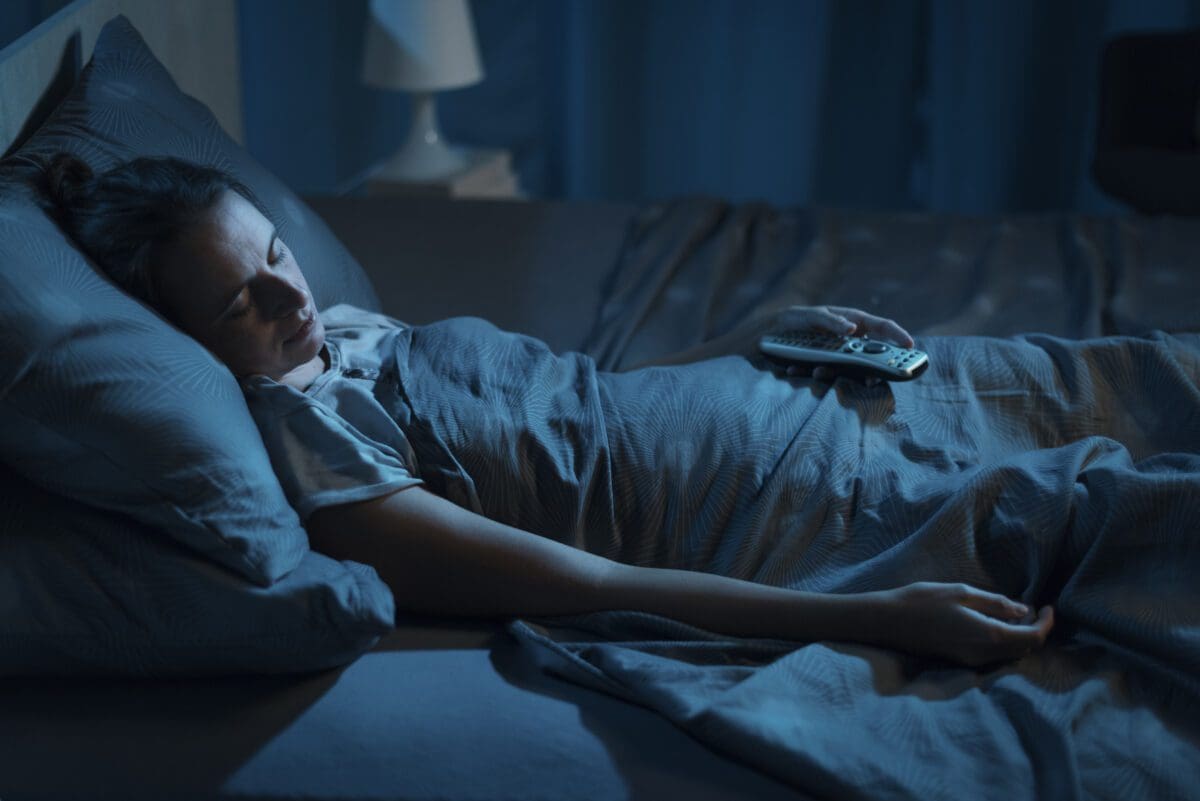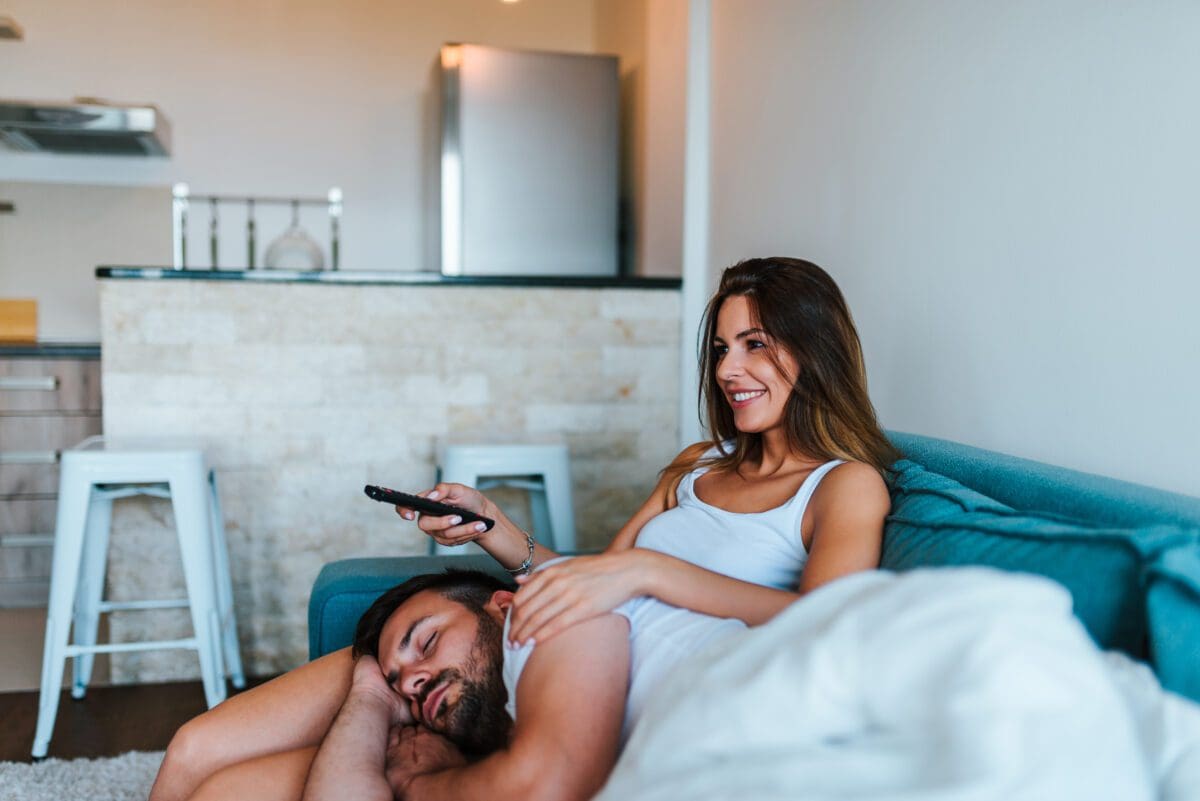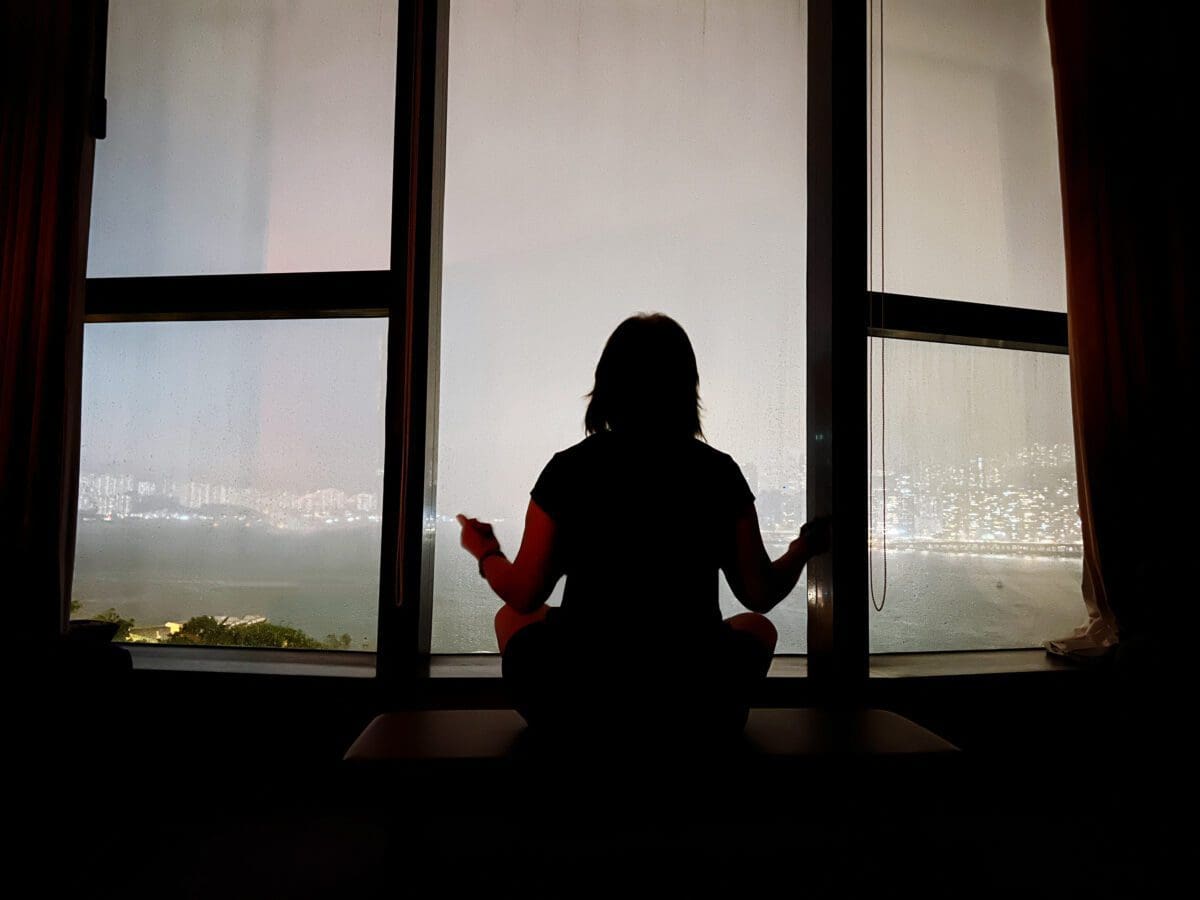If you can’t sleep without the TV on, you’re not alone. In fact, a poll by the National Sleep Foundation found that a whopping 60% of Americans regularly sleep with the TV on.
But sleeping with the TV on is harmful to your health because it can:
So if you’ve asked yourself, “Why can’t I fall asleep without the TV on?” You’re in good company because I go in depth to cover the reasons why, the harmful side effects, and the alternatives to watching TV before bed. So keep reading.
I’ve always wondered why my boyfriend can’t sleep without the TV on, and I finally found the reason after tons of research. But first, have you ever asked yourself, “What is it called when you can’t sleep without the TV on?” The answer is, it’s a version of insomnia, which generally means, struggling to fall asleep.
Noise machines produce sounds that help you sleep by drowning out bothersome noises, and televisions do the exact thing. This is especially helpful if you can’t stop thinking about what’s bothering you. Because when you’re overthinking, you’re more inclined to scroll endlessly on social media, watch TV, or find a way to preoccupy yourself with mindless stuff.
Besides using TV as its own form of a white noise machine, some people like to check their social media on it. Unfortunately, social media is designed to be addicting. It’s even hard to resist checking social media when you get a single notification sound. So checking it on your TV can turn into a habit that’s hard to quit.

While sleeping with the TV on might seem like a normal thing, did you know that it can harm you? Here are a couple of reasons to quit this habit.
When you’re near bedtime, the best way to unwind is by doing relaxing activities to “shut down” your brain. So when you watch TV, you overstimulate your brain and keep it active. This makes it difficult to fall asleep.
And even if you manage to fall asleep despite stimulating your brain, you won’t get deep sleep. Besides this, the sounds you hear from the TV might translate into bizarre nightmares, which worsens your sleep quality even more. You might also wake up suddenly if you hear a sudden loud noise from the TV.
What’s more, you might be sleeping less than eight hours, which is the average sleep time recommended for adults. Let’s say you like to watch your favorite TV show before sleeping, and you finish the first episode. But you try to convince yourself, “One more episode, and then I’ll go to sleep.”
So you watch another episode and then another one, and the cycle goes on. You’ll probably end up not getting enough sleeping hours.
But why does this matter? Well, one day of poor sleep won’t do much harm, but if this cycle goes on daily, you won’t be able to stay awake and finish your tasks properly. You might even struggle to talk properly because you’re tired and need to rest.
Watching TV at bedtime can lower melatonin production, which is the hormone responsible for regulating sleep. This is because screens like TV and smartphones emit blue light that suppresses the release of melatonin.
When your body doesn’t release melatonin at night like it used to, your circadian rhythm, aka the sleep/wake cycle, gets messed up. Consequently, your brain can no longer tell when to sleep, which ruins your sleep schedule.
I mentioned earlier that sleeping with the TV on can give you poor sleep. As a result of this, you might increase the risk of getting physical or mental issues. This includes mood swings, low sex drive, poor coordination, and memory issues.
It might even lead to serious health conditions. For instance, the risk of cancer, type 2 diabetes, sleep disorders, and heart disease might increase as a result of the blue light from the TV that disregulates the circadian rhythm.

If you want to know how to break the habit of sleeping with the TV on, I have a couple of alternatives you can try.
Doodling on a coloring book might sound childish, but you’d be surprised by how much it helps with sleeping. When you doodle on a coloring book, you put all your focus into staying in the lines, which helps you practice mindfulness.
You can buy adult coloring books from Amazon or bookstores. If you can’t sleep without the tv on, give this a shot and you might find it works better than you imagined.
If you like to leave the TV on while sleeping to relax, you can try to play ASMR. In case you’re wondering, ASMR is short for autonomous sensory meridian response, and it means getting tingling sensations from hearing a particular sound.
These tingling sensations are often relaxing, and even though not everyone gets tingles, most people find ASMR helpful in improving sleep quality.
There are countless ASMR videos on YouTube. If you try one of the videos, you’ll typically find someone whispering and cracking their fingers.
But there are many other types of ASMR out there, so explore a couple of videos until you find one that puts your mind at ease and helps you doze off.
Also, you’ll get brownie points if you play ASMR on the TV as a transition phase. This will help you stop watching TV and start listening to ASMR instead. And eventually, you’ll quit letting the TV on altogether.
Instead of leaving the TV on, you can listen to a podcast to help you sleep. This can also help you broaden your knowledge. I prefer podcasts over the radio because you can set a time limit. The same goes for books on tape like Audible, so by the time you fall asleep, they’ll stop playing.
However, if you can’t help but become fully immersed in the podcast, you should avoid podcasts altogether. This is because, in this case, podcasts will keep you alert and make falling asleep harder. I find that listening to something that doesn’t require paying attention, or that you really aren’t all that interested in, will do the trick best.
You can never go wrong with classical music, especially when you want to sleep. All you need is to open YouTube, search for “classical music”, and select whichever you find relaxing.
It’s important to note that not all classical music is relaxing; some are upbeat or dramatic. But for sleep, I recommend something mellow and downbeat, that will allow you to drift off while listening to the soft melodies.

If you like to leave the TV on to put you at ease while sleeping, you should try to meditate. Meditation can help you reduce stress, clear your mind, and achieve inner peace.
It might feel boring at first, especially if you hate staying still, so you should start out with doing five minutes of meditation until you get used to it.
Instead of staring at a screen, why not read a book? Doing so won’t strain your eyes or worsen your sleep quality, unlike watching TV. But I recommend reading a boring book, especially if you’re a bookworm. This is because if you become engrossed in reading a book, you’ll keep your mind active and struggle to sleep.
Even better, you can try to study a subject you don’t like lol. I guarantee that you’ll doze off in an instant. This used to happen to me in college and it still works to this day.
Another great method to prepare yourself for bedtime is to play white noise. Instead of playing something on TV, you can either play white noise sounds on YouTube or install an app for it. The key here is to only listen to the sounds instead of watching TV.
There are several types of white noise sounds, so it all depends on your preference. For instance, you can try to listen to ambient rain sounds. Also, if you want to completely avoid screens during bedtime, you can buy a white noise machine.
You might not be able to sleep unless you leave the TV on during bedtime because it acts as a noise machine that soothes you. I get it, you are hooked, it’s your thing, but it’s costing you.
This is a bad habit because it can worsen your sleep quality in the long run by messing up your circadian rhythm. If you are trying to ween yourself off this habit, try some of the relaxing alternatives I mentioned earlier. They can all work, you just need to find the best one that works for you and try doing it consistently. Whatever you do, just be sure not to turn off the TV!